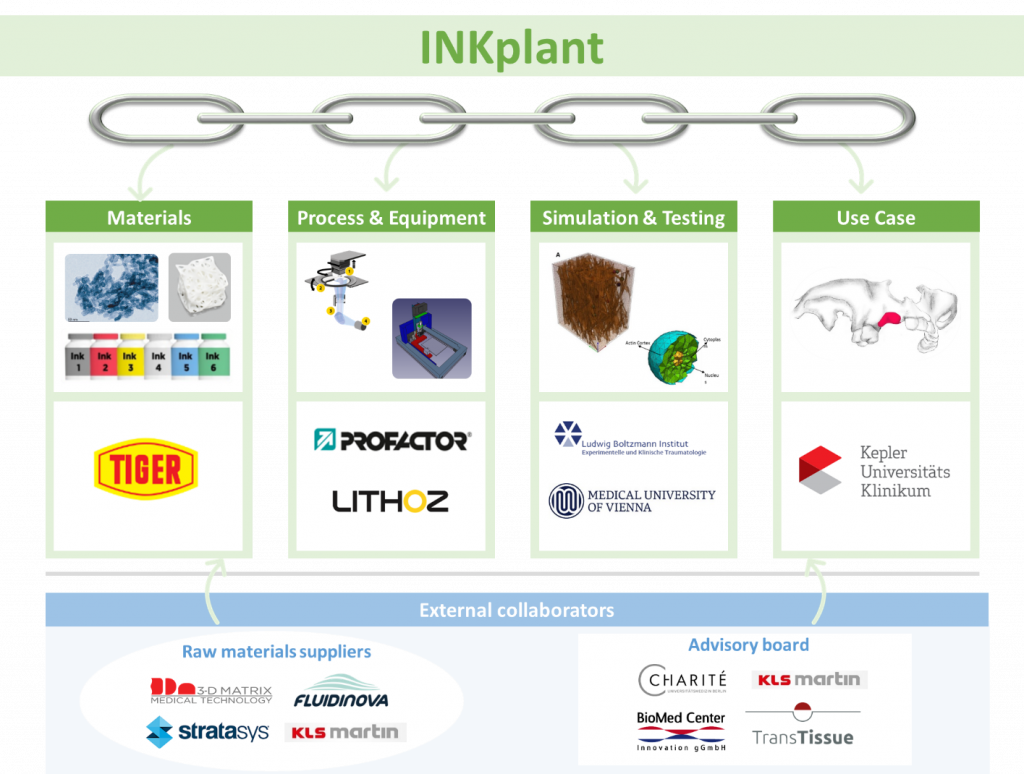By the year 2025, 22% of the European population will be aged over 65. Improving the life quality of Europe’s increasingly elderly population is one of the most pressing challenges our society faces today. One of the most common implants in elderly population are dental implants. Every dental implant needs enough peri-implant hard and soft tissue to enable the physician to mount and hold the substitute teeth. Very often, especially in elderly people, an insufficient amount of bone tissue is available resulting in the need of tissue augmentation. Current approaches include autologous bone transplants or the insertion a subperiosteal implants. However, those approaches exhibit several drawbacks, such as the need for several surgical procedures, peri-implant infections and long healing periods, which result in a big discomfort and suffering for the patients.
3D printing has the potential to revolutionize the healthcare system by providing highly sophisticated, tissue engineered implants personalized to the patient. State of the art 3D printing technologies can provide biocompatible implants with the right macroscopic shape to fit a patient-specific tissue defect. However, for a real functionality, there is a need for new biomaterials, technologies and processes that additionally allow the fabrication of an inner multi-material microstructure that induces tissue-specific regeneration.
INKplant will develop a hybrid Additive Manufacturing process, which provides advanced multi-material tissue engineered subperiosteal implants personalized to the patient. The implants exhibit a gradient in materials and porosity, and consist of a hard phase to provide the required support for the dental implant covered by a composite phase especially optimized for bone healing, which allows stable integration of the base of the tooth prosthesis.
The project envisages the development of a process to enable bi-material lithography-based ceramic manufacturing (LCM) process to fabricate the hard phase. For a good osseointegration and promotion of tissue regeneration, the 3D ceramic part will be covered with a composite phase. For the fabrication of this composite phase, a process will be developed to enable the 5-axis 3D multi-material inkjet printing of 3D shaped structures.
INKplant will address the big challenges of the project with a consortium formed by partners covering all the areas of expertise relevant for the project: material development, AM, tissue engineering, biomedical simulation and maxillofacial surgery.
Profactor is the coordinator of the project, and the consortium is completed with Medical University of Vienna (MUW), Kepler Universitätsklinikum, Ludwig Boltzmann Institute for Experimental and Clinical Traumatology, Lithoz GmbH and TIGER Coatings GmbH& Co. KG

Project Name:
Ink-based hybrid multi-material fabrication of next generation implants
Funding:
FFG Production of the Future
Duration:
01.04.2020 – 31.03.2024
Partners:
- Medical University of Vienna (MUW), Center for Medical Physics and Biomedical Engineering
https://zmpbmt.meduniwien.ac.at/en/
- Kepler Universitätsklinikum -Clinic for Oral and Maxillofacial Surgery
https://www.kepleruniklinikum.at/versorgung/kliniken/mund-kiefer-und-gesichtschirurgie/team/
- Ludwig Boltzmann Institute for Experimental and Clinical Traumatology
https://trauma.lbg.ac.at/en/structure-and-organisation/about-us
- Lithoz GmbH
- TIGER Coatings GmbH& Co. KG


